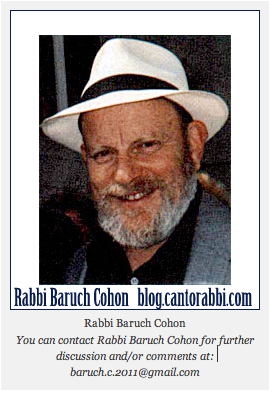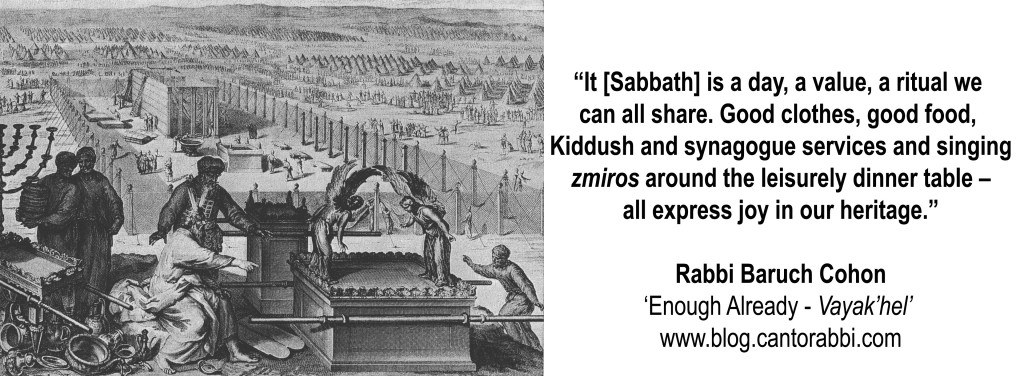
ENOUGH ALREADY! – Vayak’hel – Ex. 35:1-38:20, by Rabbi Baruch Cohon
This week we will read the portion Vayak’hel – “Moses assembled the entire people.” Usually this section is joined with the next one, Pikudey – “the records of the Tabernacle.” But during a leap year like this one, the two sections occupy two weeks. So this week we can concentrate on Moses’ purpose in calling a super meeting.
As a nation, they are to embark on a super task. Still camped at Mount Sinai, this meeting takes place, as Rashi informs us, the day after Yom Kippur. Moses just obtained Divine forgiveness for the sin of the Golden Calf and received the second Tablets of the Law. Now he will lead his people to implement their connection to G-d by building a holy Tabernacle. This task is not limited to any chosen few, but must include the entire Israelite nation. Accordingly, Moses will call on all who are willing to donate t’rumah – an offering – consisting of the raw materials which will be used to create the Tabernacle. “Take from yourselves an offering for G-d,” he says. “All who are generous hearted, bring the offering… gold and silver and copper; blue and purple and scarlet linen, goat’s hair and red-dyed ramskins, sealskins, acacia wood. Oil and spices, and jewels for the sacred garments.” There’s more, of course. The women were to weave, and the men to transport, and all are called on to dedicate their possessions and their work. Because this travelling house of worship is to represent them all.
But this is not Moses’ first message to this super meeting. Before even starting on his list of raw materials, he instructs his people to work 6 days and rest on the sacred seventh, Shabat. “Anyone who works that day will die,” he says. Don’t even build a fire on the Sabbath day.
Nokhamol Shabbes? Again Shabos? This makes no less than 8 times it is discussed in the Torah so far. Not to mention at least an equal number coming up. Clearly our tradition spares no opportunity to state the importance of Sabbath observance. Keeping Shabos may not be easy, indeed it frequently causes serious problems, but the one situation where it may be annulled is pikuakh nefesh – saving a life. First comes human life. Observance, no matter how important, comes second. Still, a sacred structure like the Tabernacle should not be built on any sacred days.
Of all the ideals and concepts and processes that Judaism created and gave to the world, perhaps nothing can compare with the weekly day of rest. As other societies observe it on different days – Sunday or Friday, as we know – the Jewish Sabbath can become a serious problem for those who try to observe it in non-Jewish countries. Yet rightly was it stated that “more than Israel kept the Sabbath, the Sabbath kept Israel.” It is a day, a value, a ritual we can all share. Good clothes, good food, Kiddush and synagogue services and singing zmiros around the leisurely dinner table – all express joy in our heritage. Whether our work involves building a Tabernacle or building an outhouse, it should not be done on the Sabbath.
But frequently it is. Strict Sabbath observance was long considered impossible in modern life. Today, some Jews are reviving Shabos with inventive skill. Take a day to unplug! Use Friday night for family visits. Join groups like National Jewish Outreach in a communal Shabat Across America. Creative people are coming up with various ways to be a little more Jewish once a week.
In our Torah portion, only after Moses reminds the nation of the importance of the Sabbath, does he call on them to contribute their offerings to the construction of the Mishkan, the Tabernacle. Betzalel and Oholiav, the master builders/architects/designers, take all this donated raw material and begin their work. Soon they realize they have more than they need. Enough already! Stop bringing! When they notify Moses of this surplus, he orders a loud proclamation: “Let no man or woman do any more!” Definitely the first and only time that a temple fundraising project had to be stopped for its success! And here Moses accomplished something even more important: national unity. How did this happen? They were working together, doing it themselves while sharing the Sabbath, and thus they developed a strong community.
By working together, joining in a common cause, and observing our Mitzvos as faithfully as possible, we can still produce results that outstrip our needs. Worth trying, isn’t it?


